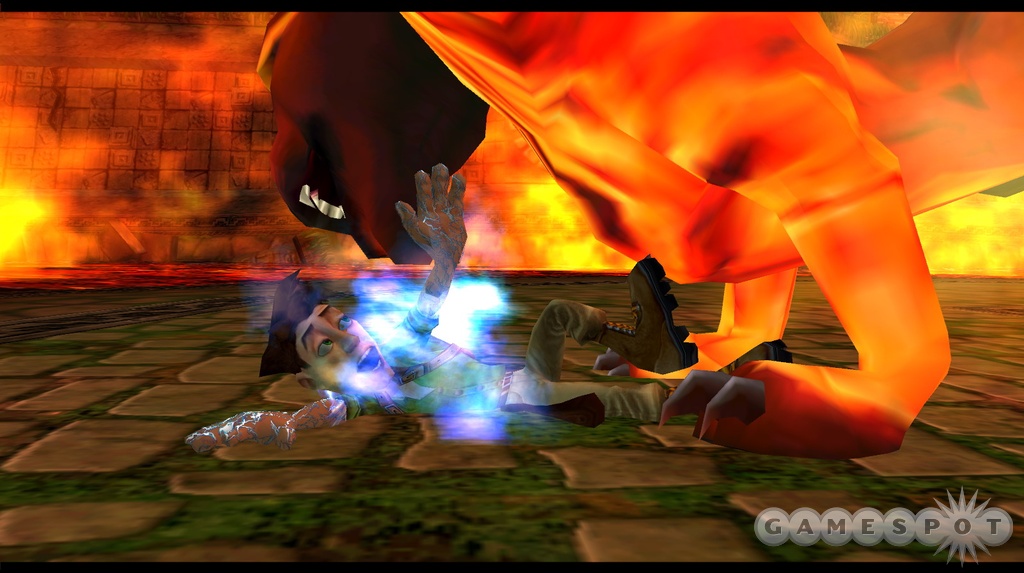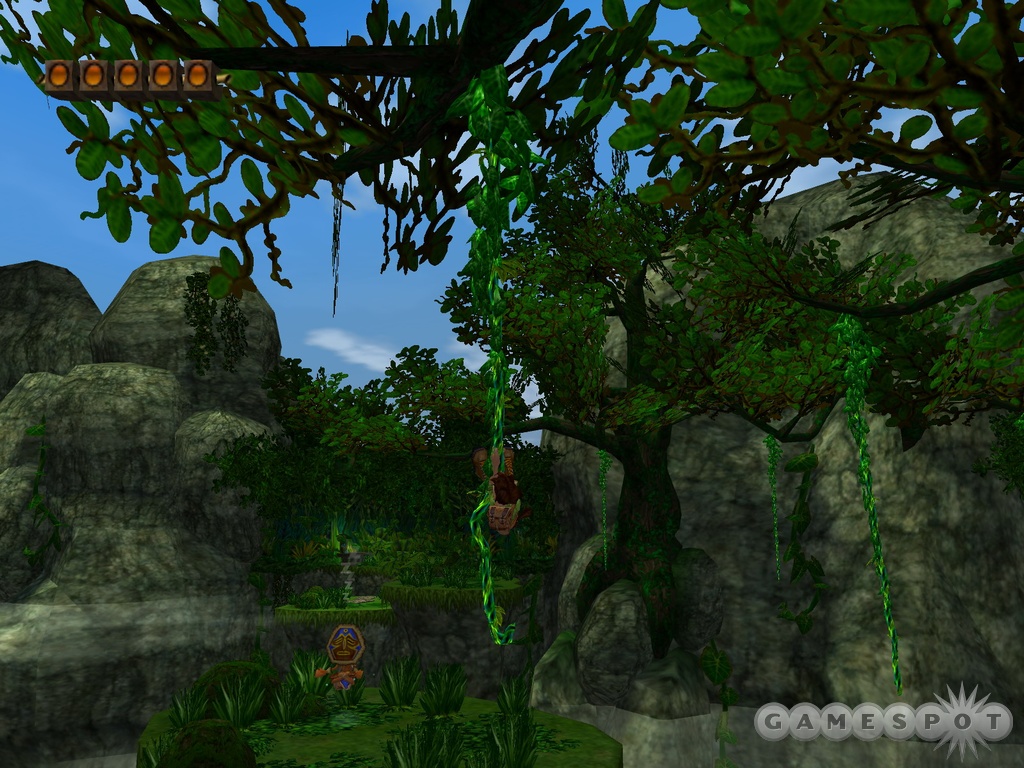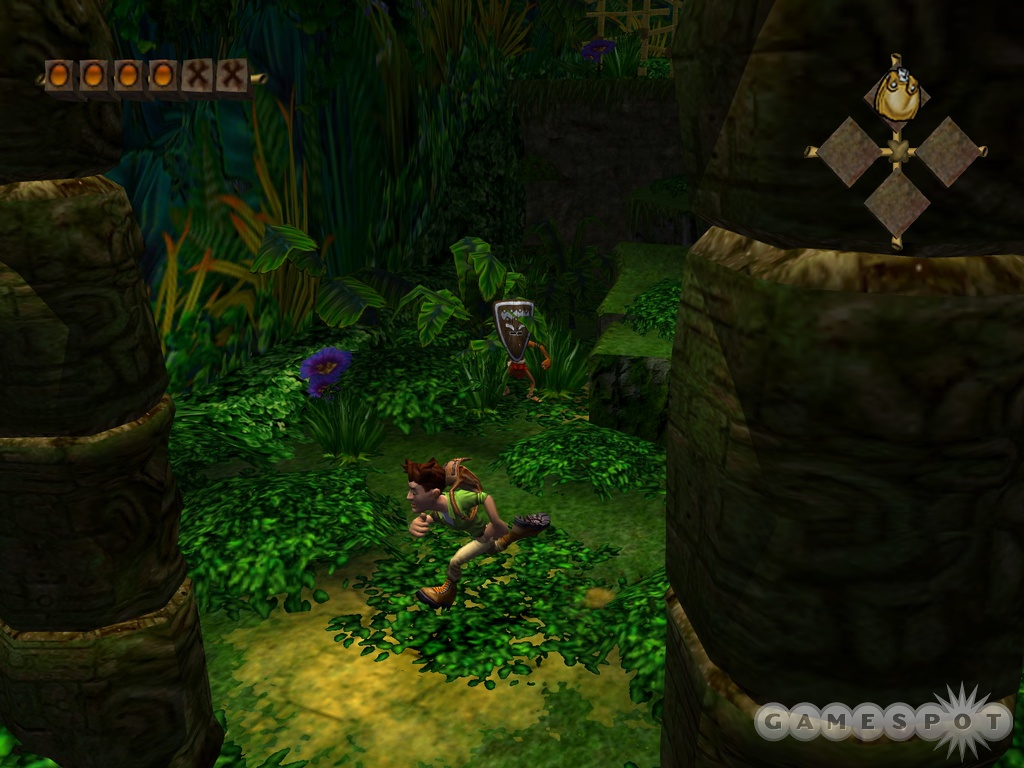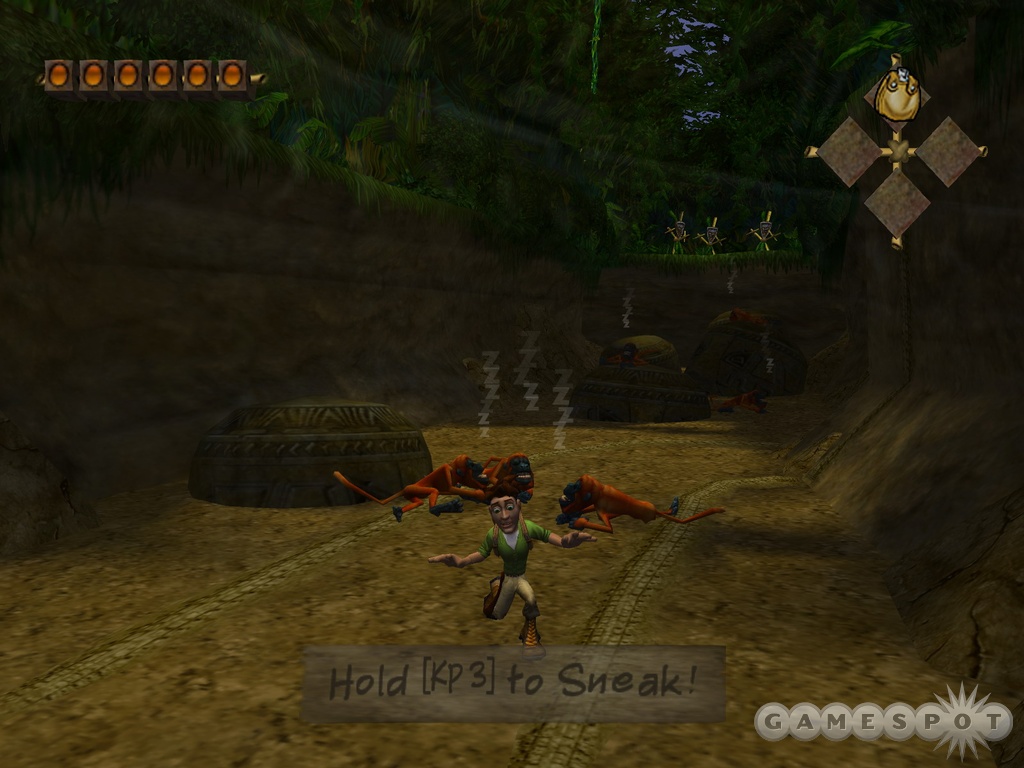In many ways, the original Pitfall! for the Atari 2600 can be held primarily responsible for inventing the modern platforming genre. Without that seminal game, we would have never experienced the trials and tribulations of Pitfall Harry, jumping over pits, climbing up and down ladders, and swinging from vine to vine across the dense jungles--or, at least as dense as the 2600 was capable of rendering. Since Harry's original adventure, many games have built upon the basic platforming concepts found in that game, consistently pushing the envelope of what platforming can be. Yet somehow, in a sad twist of irony, most of the subsequent games featuring the Pitfall moniker didn't do anything for the genre, instead serving as little more than lame retreads of previously explored territory. Earlier this year, Activision delivered its latest addition to the series on consoles, titled Pitfall: The Lost Expedition. Much like many of its Pitfall predecessors, it didn't break any manner of new ground, yet it still managed to be pretty fun on its own merits. Now The Lost Expedition is available for PCs, and though it features a few more annoying control restrictions than its console counterparts, it's still a solid platformer.

The Lost Expedition does add one slight innovation to the series, in that it opts to give its protagonist a legitimate personality this time around. This iteration of Harry is certainly not the same faceless, pixelated fellow that we've all come to know over the years--nay, the new Pitfall Harry is quite different. The new Harry is dashing, daring, and, at least in his own mind, quite the lady-killer. The story of The Lost Expedition begins with our hero battling for his life against a demonic jaguar amid a ring of fire. After some intense combat, Harry, thinking he has won, lets his guard down, allowing the jaguar to get the best of him. Right as he's about to be dealt the seemingly final blow, Harry begins to narrate, and we're whisked back in time to the previous day, aboard a rickety passenger plane filled with various explorer types. Harry is chatting it up with a fellow explorer by the name of Dr. Bittenbinder, who just happens to be traveling with a young, beautiful, and slightly bookwormish associate named Nicole. Suddenly, lightning strikes the plane and it is sent spiraling down toward the thick South American jungle.
The entire plot of the game is told through between-mission narration by Harry. Initially, the story simply revolves around Harry's attempts to round up lost members of the expedition who were aboard the doomed plane. However, after some time, things spiral off into a number of silly directions. Ancient prophecies and cities are discovered, rival tribes square off with one another, an old rivalry between Harry and an evil explorer named Jonathan St. Claire is renewed, and, further adding to the utter wackiness of it all, you are eventually befriended by a talking cheetah. Without diving too heavily into spoiler territory, it can be said that the story of The Lost Expedition features some exceptionally dumb plot points, but thankfully, the game in no way tries to take itself seriously. Apart from hokey, eye-rolling moments, the dialogue and story progression are pretty amusing, and there are more than a few clever Indiana Jones references to keep you on your toes. Though you'll never find yourself heartily chuckling at any of the game's gags, you'll certainly be entertained.
Most of The Lost Expedition's gameplay follows the industry standard for platformers to the letter. Harry can jump and double-jump over various objects and platforms, engage in some fairly simplistic combat, and use various weapons and items that he picks up along the way. Many of the items Harry uses throughout the game actually tie in to the progression of the overall story. Numerous areas in the gameworld are blocked off, and only specific items will allow Harry to traverse them. For instance, you'll come across large walls that must be climbed with a pickax or blown apart with dynamite, passages blocked by gaseous plants that can only be circumvented using a gas mask, and objects that need to be knocked over using a basic slingshot. To use these items, you have to equip them, and then use them via a dual-analog controller's right control stick or a keyboard's arrow keys. This mechanic actually independently controls Harry's right arm and lets him use items and pick up objects you encounter during the game. It's kind of a neat mechanic, and it's certainly more interesting than your standard "action button" concept.
The one issue that stems from this right-arm control concept, however, is actually the one main issue that separates the PC version of Pitfall from the console versions. Basically, if you plan to play the game on a keyboard, then you've got nothing to worry about, as keyboard control plays fine. However, if you plan to use a dual-analog controller, you'll need to use a high-end model. We tried the game with a couple of different controllers, and actually found that the game wouldn't fully recognize the controller's right analog axis. The controller would only go side to side, and not a full 360 degrees, eliminating any ability to move Harry's arm up or down, both of which are highly necessary to play the game effectively. However, on our third try, we were able to get the full range of axis motion using a Thrustmaster dual-trigger controller. If you have a controller that doesn't work quite right, you can always switch back and forth between the controller and keyboard, but that gets very annoying very quickly.

Combat in The Lost Expedition is much more of a necessity than you might initially think when first picking up the game. From the get-go, Harry can execute a few basic strike moves and a jumping kick, and as the game goes on, he can purchase new attacks from various shamans that appear in certain levels. Most enemies are easily dispatched using weapons and basic combat moves, but a few tougher ones require upgraded attacks. The only truly frustrating thing about the game's combat is that the action can get pretty hectic when multiple enemies are attacking, and a combination of a lack of real defense on Harry's part and a rather stuttery camera makes things more difficult than they need to be. You will eventually come upon a shield that Harry can use during combat, but it only blocks attacks coming from the front and from directly above, leaving plenty of vulnerable areas. More often, your best bet is to just punch and run or, in later stages of the game, use specialty attacks like spin kicks and such to try to clear the area as quickly as possible. This isn't always an option, and it depends on how accessible enemies are and how many of them there are. Also, the camera has a tendency to adjust to a position that prevents you from seeing more than half the enemies onscreen. For the most part the game's combat system works just fine, but when its clunkier aspects appear, they tend to stick out.
Similar to the combat system are the game's more traditional platforming elements, which work pretty well most of the time, but there are problems to speak of. Most of the traditional Pitfall-style mechanics are present in The Lost Expedition, like pits that open and close, vines for you to swing from, and more than your fair share of jump puzzles. Each of these elements is handled well enough in The Lost Expedition, though there are some frustrations that stem primarily from some slightly off-kilter physics. It's usually pretty easy to control Harry and get him to jump from vine to vine, or from platform to platform and such, but every now and again, you may miss a jump onto a platform ever so slightly--to the point where you will likely think you've made the jump, even--which causes Harry to float somewhat above the ground, and even though it seems like he should land on the platform, he slides off of it. Because the game is quite reliant on jump puzzles, and some of them are quite lengthy in nature, this occasional hiccup can be a big headache.

Another problem with The Lost Expedition is that it just isn't paced particularly well. Especially toward the second half of the game, frequent backtracking trips are required to get to your next objective, and some of these trips can be almost obscenely long. There are some instances when shortcuts give you a quick trip halfway across the world, limiting you to a minimal amount of actual footwork, but there are still far too many times when you'll actually have to navigate your way back across a hefty portion of the game's world just to start your next mission. The whole game clocks in at around 9 to 10 hours, though it would probably be closer to eight if it weren't for the needless retracing of previous steps, which ultimately makes these parts of the game seem even more like mere filler.
Fortunately, when you aren't forced to backtrack, the portions of the game that involve exploration and puzzle-solving are actually pretty good. The Lost Expedition features a nice array of different areas to poke around, and figuring out the best way to get around and solve the puzzles necessary to progress, though not terribly difficult, is still fun. Also, the game does have a nice habit of occasionally throwing you unexpected curveballs, such as the first time you find yourself exploring one of the game's animal temples. Without spoiling the whole thing for you, let's just say that you'll gain a new appreciation for monkeys and their antics after the experience.
The Lost Expedition isn't an especially impressive-looking game, but what it lacks in technical prowess it mostly makes up for in charm. The basic look of the game is quite goofy, with exaggerated, gangly character designs, bright and colorful color schemes, and plenty of zany animation. There isn't a huge variety of animation in the game, but what's there looks extremely fluid and seamless. Every environment in the game features a nice variety of terrain and set pieces, and on the whole, they're nice to look at--though mostly from a distance, because when you get too up close and personal with the environments, you tend to take more notice of the less-than-impressive textures and lousy effects, such as the absolutely atrocious in-game water effect. The PC version of the game looks roughly akin to the Xbox version, but with overall crisper graphics. Running the game on a high-end PC generally displays much cleaner textures and very low aliasing, with little to no frame rate troubles. On lower resolutions, the game gets a little less pleasant looking, but not so much as to make the game look significantly worse by any means.
The Lost Expedition's sound quality is likely its best asset. The voice acting for Harry and the rest of the game's wacky roster of characters is great, featuring well-delivered dialogue and some solid comic timing. The game also includes a well-composed, mostly orchestral-sounding soundtrack. Each piece of music fits its respective environment quite well and invokes the proper feelings of dread, tension, excitement, and the like. Most of the in-game sound effects are appropriately nutty, as is the dialogue of some of the random enemy characters. The only annoyances to be found are the semi-obnoxious repetition of some of the enemy dialogue, such as the dialogue of the "native" characters, and the high-pitched squealing of the game's howler monkeys. When you're dealing with only one or two monkeys at a time, this isn't really a problem, but if you get stuck facing four, five, or even more of them, the noise level turns into an unbearable cacophony. Fortunately, though, this doesn't happen too often.

Pitfall: The Lost Expedition has as much give and take as you'll find in a modern platformer. For every good quality it features, there's an issue to be found. However, this is not to say that all enjoyment from the game is negated in any way--in fact, if you can find it within yourself to simply grin and bear some of the problems the game has, you'll likely find The Lost Expedition to be pretty enjoyable. The game is probably best suited as a rental, but obviously PC owners don't have that option. However, for its reduced $20 price tag, Pitfall: The Lost Expedition is still worth checking out for any PC player on the hunt for a good platformer.